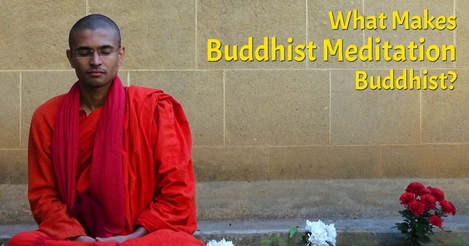What makes Buddhist Meditation Buddhist?
All forms of Buddhist meditation have one ultimate goal: the complete eradication of suffering from the human mind. The methods of meditation that the Buddha taught are in no way mystical or dependent on an outside force or energy. The Buddha sometimes compared his meditation training to the mundane task of washing one’s face. Just as there is a clear method to remove dirt from one’s face, so to there is a clear method to remove the problems from the mind that cause suffering: greed, hatred and delusion. When the mind has been cleansed of these three stains through meditation, then it can only be at peace.

Some of the Buddha’s meditation methods confront these problems head on. Metta meditation, or loving-kindness meditation, trains the mind to overcome thoughts and intentions of hatred. When we are training the mind this way, we break the habit of dividing the world into those we have goodwill towards and those we do not. We have the wish for the welfare of all, whether they are near or far, human or non-human, friendly or unfriendly. When the mind is very solid in this attitude, then even in the face of other people’s hatred we don’t give in to the same thoughts.
Meditations that train the mind to see the complete nature of the human body help us to overcome greed and attachment toward it. Normally we like to think the body is something that we can rely on and will last for a long time. In reality even a very young and strong body is quite frail and easily destroyed. When we contemplate on the nature of dead body remembering that our own body will one day meet the same fate, then we give up unhealthy attachment to it. When we meditate on the parts of the body and bodily fluids that are not so pleasant, we can have a very neutral attitude towards what we would like to see as beautiful.
Some types of meditation specifically train the mind to concentrate. The Buddha understood that a scattered mind is unable to see the world in a way that develops wisdom. Meditation on observing the in and out movement of the breath helps us to develop the kind of concentration we need to directly see how all phenomenon arise and pass away—both internal ones and external ones.
There are other types of meditation that simultaneously cause the mind to be happy and to develop correct thinking. For example one method of mediation the Buddha taught involves recollecting our own wholesome, ethical behavior, or our own generosity. He understood that when we remember the good things that we have done for ourselves and others the mind becomes happy and peaceful. This well-earned happiness then leads to concentration. By remembering our good actions we reinforce our confidence that good actions lead to good results.
Some meditations give us a sense of spiritual urgency to practice these various mental trainings. Meditation on death gives us the opportunity to remember how quickly life passes and what a unique opportunity we have to develop the mind. In this way we can take a stock of the unhealthy habits of our body, speech and mind and feel a happy urgency to overcome them while we can.
Some types of meditation help us to develop faith in the cornerstones of the Buddha’s teachings. By systematically calling to mind the specific qualities of the Buddha, his teachings, and those who have followed his teachings to the final goal, we develop confidence in the Buddha’s enlightenment, the truth of his teachings, and the power of those teachings to lead to the complete eradication of suffering. When we are confident in these things, then we are able to make the sacrifices necessary to give up the temporary happiness of sensual pleasures for the more stable happiness that meditation can offer.
These are just some examples of types of meditation the Buddha taught. When practiced correctly, they all lead to the ending of suffering. Here at Great Cloud Buddhist Monastery, you have the opportunity to learn and practice all of these forms of Buddhist meditation.
Learn about all of our activities to help you learn and practice these meditations.
|
Stay in touch by liking us on Facebook:
You may also be wondering...
|
|

